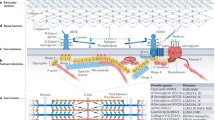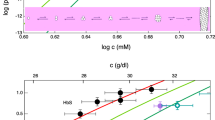Abstract
THE existence of two forms of hæmoglobin is well known. The fœtal form is found in the fœtus and in the new-born mammal, the other occurring in the older individual. It is remarkable that whereas the character of the hæmoglobin depends on genetic structure, this protein changes its composition during the growth of the individual. That this change is a profound one is apparent from the differences in amino-acid composition of fœtal and later hæmoglobin. The fact that in the so-called Mediterranean anæmia, which is a hereditary inborn error in metabolism, the fœtal form of hæmoglobin is still present in the older individual, indicates that replacement also of the fœtal hæmoglobin by the adult form is governed by hereditary factors.
This is a preview of subscription content, access via your institution
Access options
Subscribe to this journal
Receive 51 print issues and online access
$199.00 per year
only $3.90 per issue
Buy this article
- Purchase on Springer Link
- Instant access to full article PDF
Prices may be subject to local taxes which are calculated during checkout
Similar content being viewed by others
References
Pedersen, K. O., “Ultracentrifugal Studies on Serum and Serum Fractions” (Almquist and Wiksells Boktryckeri AB, 1945).
Theorell, H., and de Duve, Chr., Arch. Biochem., 12, 113 (1947).
Author information
Authors and Affiliations
Rights and permissions
About this article
Cite this article
JONXIS, J., WADMAN, S. A Fœtal Form of Myoglobin. Nature 169, 884–886 (1952). https://doi.org/10.1038/169884a0
Issue Date:
DOI: https://doi.org/10.1038/169884a0
This article is cited by
-
Elektrophoretische Untersuchungen des Myoglobins des Menschen
Zeitschrift für Die Gesamte Experimentelle Medizin einschließlich experimentelle Chirurgie (1968)
-
Über den Myoglobingehalt des Herzmuskels des Menschen
Archiv für Kreislaufforschung (1967)
-
Fœtal Myoglobin in the Urine of an Adult
Nature (1963)
-
Amino-Acid Composition of Adult and Fœtal Myoglobin of the Cow
Nature (1957)
Comments
By submitting a comment you agree to abide by our Terms and Community Guidelines. If you find something abusive or that does not comply with our terms or guidelines please flag it as inappropriate.



